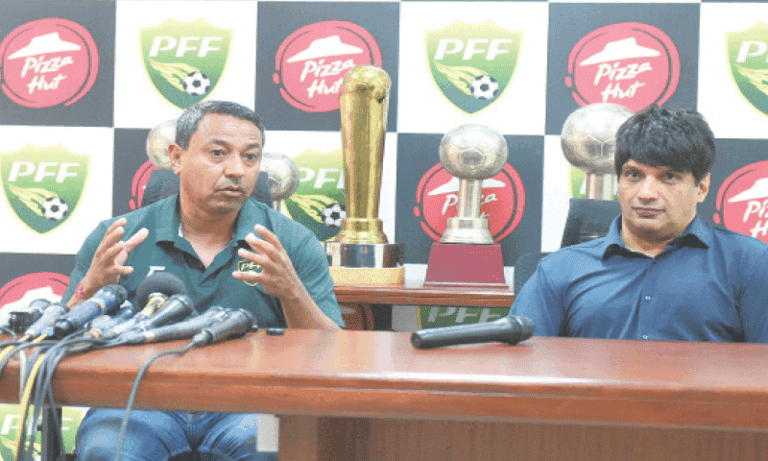Lahore: One thing Nolberto Solano is very clear about is that being head coach of Pakistan’s football team is no bed of roses. Things didn’t come easy for him as a player, he says. And he doesn’t expect them to be any better for him as coach. That’s what has brought the Peruvian former Newcastle United cult hero to football’s backwaters in Pakistan.
The sport in the country has seen little progress due to a decade-long institutional crisis in the Pakistan Football Federation. There have been some highs, notably Pakistan’s historic victory over Cambodia in 2023 — the first time the national team won a FIFA World Cup qualifier — but otherwise, it’s been a tale of woe compounded by a non-existent domestic structure.
Stephen Constantine, Solano’s predecessor who guided Pakistan to that famous victory over Cambodia, departed under a cloud; the newly-elected PFF leadership under president Mohsen Gilani having opted to look for other options. Enter the 50-year-old Solano, whose breathtaking skill on the wing made him a fan favourite at Newcastle but who still has a lot to prove as a coach.
None of his stints as head coach since leaving the job as Peru’s assistant coach, where he notably oversaw his nation qualify for their first World Cup in 36 years, has lasted more than a year. The Pakistan job offers him a chance to reset but he believes that any success will have a lot of contributing factors.
“My journey hasn’t been easy at any time,” Solano told Dawn in an exclusive interview just before he was unveiled to the media here at the PFF headquarters on Thursday. “And it won’t be easy here too.”
Solano recalled how he first broke into the consciousness of his first club side Sporting Cristal through a trial arranged by his father, who became a taxi driver after leaving the Peruvian army.
“I had to work very hard to impress at the trial,” said Solano. “In Peru, there is fierce competition for places … Everyone there loves football. Everyone there wants to be a footballer.”
Sparkling performances for Cristal saw Solano earn a move to Argentine giants Boca Juniors where he played with the legendary Diego Maradona. Only a year later, he had English Premier League clubs hovering over him and at a time when South American players preferred to go to Spain or Italy, he opted to take a path less trodden when he opted to sign for Newcastle in 1998.
“During that time, Spain or Italy was the easier option because there was no language barrier,” reflected Solano, who not only took upon himself to learn a new language and culture but also adjust to a different playing style with English football being more physical.
“The spell at Boca somewhat made it easier [to make the transition] because it is very similar,” said Solano. “But it was a test, and I wanted to test myself because [forward] Faustino Asprillia, who was Colombian, had a successful spell at Newcastle.”
He didn’t disappoint. Arriving after Asprilla had joined Parma, Solano became a first-team regular at Newcastle with not only his playing ability but also his personality making him a fan favourite. But major silverware eluded both Newcastle and Solano, who also had spells at Aston Villa, West Ham United, Leicester City and Hull City in England before retiring.
Solano’s biggest regret, though, remains that he was unable to help Peru qualify for the World Cup as a player but some consolation came when he helped his country end that long drought in Russia 2018.
“It was a big achievement for the whole country as a whole to get to the World Cup after such a long time,” said Solano. “[Head coach] Ricardo Gareca did a wonderful job in unifying the team and we were able to do that. I think the lack of discipline was one of the reasons my generation was unable to qualify for the World Cup.”
Targets and expectations, though, are more modest with Pakistan. But Solano is keen on not only bringing the South American flair but also grit and determination, and the fighting spirit, to the national and Under-23 teams. Many players, the local-based ones in particular, have had to do without any kind of domestic action. But in his first few training sessions, he has seen that the talent is promising.
“I’ve seen some really talented players who have had to make do without domestic football,” he said. “That [domestic football] is something we need to collectively work on: me, the PFF and its leadership. But the big thing is that they’re willing to fight for a spot on the national team.
“It is something I’ve told the diaspora players I’ve spoken to since I took over. I’ve told them that they have to try and make their presence felt at the training camps because those who are here are willing to give everything to make the team.”
For a man who has fought so many battles himself, Solano is counting on that desire to lift Pakistan football.
Published in Dawn, August 22th, 2025

